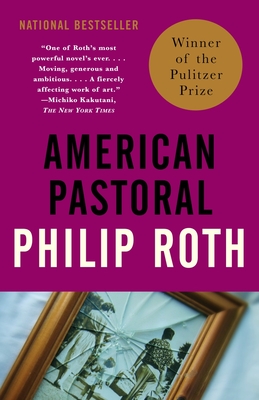Philip Roth gives us a novel of unqualified greatness that is an
elegy for all our century's promises of prosperity, civic order, and
domestic bliss. Roth's protagonist is Swede Levov, a legendary athlete
at his Newark high school, who grows up in the booming postwar years to
marry a former Miss New Jersey, inherit his father's glove factory, and
move into a stone house in the idyllic hamlet of Old Rimrock. And then
one day in 1968, Swede's beautiful American luck deserts him.
For Swede's adored daughter, Merry, has grown from a loving, quick-witted girl into a sullen, fanatical teenager—a teenager capable of an outlandishly savage act of political terrorism. And overnight Swede is wrenched out of the longer-for American pastoral and into the indigenous American berserk. Compulsively readable, propelled by sorrow, rage, and a deep compassion for its characters, this is Roth's masterpiece.
Lucas says:
The Swede's ideal and pastoral life begins to unravel when his daughter is born. It is apparent early on that this daughter will be a bane to The Swede when her stuttering causes her mother to be ashamed of her own child. This shame is psychologically absorbed by the daughter for years during her childhood and later is regurgitated in the form of an act of unspeakable violence.
It is during the aftermath of his daughter's violent act that The Swede's life really takes a turn for the worst. He has an affair, his wife has an affair, his daughter disappears from his life, he is taken advantage of and robbed by anonymous antiwar radicals . . . and all of these bad events culminate at the point in the story where, at a dinner party in his own home, The Swede's father is stabbed in the face with a fork by an alcoholic guest.
I think one of the best ways to understand this book is to look at it as Roth 'flipping the bird' at the concept of the American Dream. Mr. Roth may not be the first author to write a book like this, nor will he be the last . . . but I can say that this is one of the most important works of fiction about contemporary American life I've ever read. Well done, Mr. Roth."
For Swede's adored daughter, Merry, has grown from a loving, quick-witted girl into a sullen, fanatical teenager—a teenager capable of an outlandishly savage act of political terrorism. And overnight Swede is wrenched out of the longer-for American pastoral and into the indigenous American berserk. Compulsively readable, propelled by sorrow, rage, and a deep compassion for its characters, this is Roth's masterpiece.
Lucas says:
"I love it when an American author uses the format of the novel
to examine the American Dream. I love it even more when that
examination exposes the idea of the American Dream as unreal and
unattainable idealism and causes it to unravel and become one big mess.
In this novel we meet Swede Levov, the quintessential and all-American son of Jewish immigrants. He starts his promising American life as a high school sports star, he then becomes a marine, he marries Miss New Jersey, successfully takes over the family business, buys an expensive home with land in the country, has a daughter, etc. The Swede (as he is called by his admirers) seems to have all the parts needed to piece together the American Dream, and yet, his life turns out quite differently than one might expect.
In this novel we meet Swede Levov, the quintessential and all-American son of Jewish immigrants. He starts his promising American life as a high school sports star, he then becomes a marine, he marries Miss New Jersey, successfully takes over the family business, buys an expensive home with land in the country, has a daughter, etc. The Swede (as he is called by his admirers) seems to have all the parts needed to piece together the American Dream, and yet, his life turns out quite differently than one might expect.
The Swede's ideal and pastoral life begins to unravel when his daughter is born. It is apparent early on that this daughter will be a bane to The Swede when her stuttering causes her mother to be ashamed of her own child. This shame is psychologically absorbed by the daughter for years during her childhood and later is regurgitated in the form of an act of unspeakable violence.
It is during the aftermath of his daughter's violent act that The Swede's life really takes a turn for the worst. He has an affair, his wife has an affair, his daughter disappears from his life, he is taken advantage of and robbed by anonymous antiwar radicals . . . and all of these bad events culminate at the point in the story where, at a dinner party in his own home, The Swede's father is stabbed in the face with a fork by an alcoholic guest.
I think one of the best ways to understand this book is to look at it as Roth 'flipping the bird' at the concept of the American Dream. Mr. Roth may not be the first author to write a book like this, nor will he be the last . . . but I can say that this is one of the most important works of fiction about contemporary American life I've ever read. Well done, Mr. Roth."


No comments:
Post a Comment